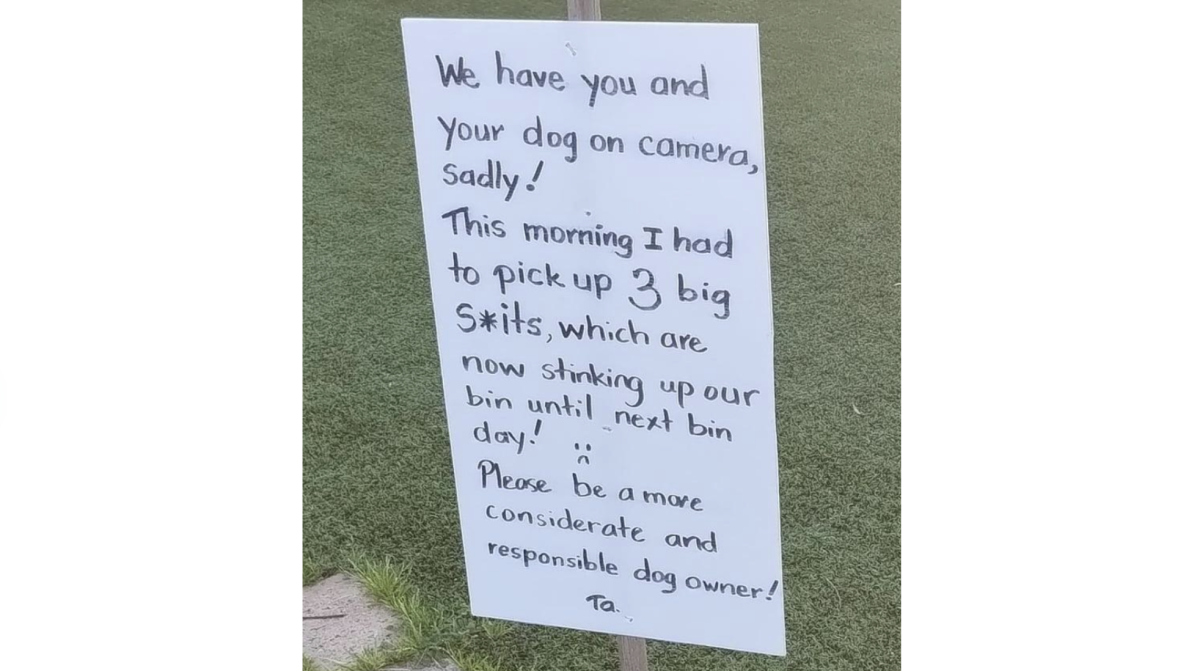
When a Perth homeowner's polite-yet-pointed yard sign about irresponsible dog owners went viral this week, it struck a chord with thousands of Australians dealing with the same infuriating problem. But what many don't realise is that this isn't just about courtesy or keeping lawns tidy—it's a serious health issue, particularly for older Australians.
The handwritten sign, stapled to a wooden post, read: We have you and your dog on camera, sadly! This morning I had to pick up three big s***s, which are now stinking up our bin until next bin day. Please be a more considerate and responsible dog owner! Ta.
In this article
More than just an eyesore
With over 6 million dogs across Australia's 28.7 million pets, and approximately 48 per cent of households owning dogs, this problem affects communities nationwide. But the issue goes far beyond unsightly messes on footpaths and front yards.
'One gram of dog waste contains about 23 million coliform bacteria, nearly twice the amount found in human waste'
One gram of dog feces can contain up to 23 million fecal coliform bacteria. These bacteria, along with other parasites and pathogens, can cause a variety of illnesses in both humans and animals. For older Australians, who may have compromised immune systems or underlying health conditions, the risks are particularly concerning.
The serious health implications
For older Australians, pet ownership can improve their quality of life, reduce symptoms of depression and anxiety and slow down symptoms of dementia. However, encountering irresponsible pet ownership in their neighbourhood can pose real health threats.
Health risks from dog waste exposure
E. coli, Salmonella, and Campylobacter bacteria causing severe gastrointestinal illness
Roundworms that can persist in soil for years and cause toxocariasis
Hookworms leading to skin infections ('creeping eruption')
Giardia and Cryptosporidium parasites causing digestive problems
Multi-drug resistant bacteria including MRSA
Particular risk to children, elderly, and immunocompromised individuals
Bacteria, such as E. coli, salmonella, and campylobacter, can also be present in dog waste and lead to severe illness, particularly in young children, the elderly, and those with weakened immune systems. What's even more alarming is that some micro-organisms (such as Roundworms, E. coli, and Giardia) can persist and survive in your yard for up to four years if not picked up.
Research has also found concerning antibiotic-resistant bacteria in dog waste. Studies have isolated multi-drug resistant Enterococci and methicillin-resistant Staphylococcus aureus from dog faecal samples. The presence of the resistant bacteria in an urban environment may represent a public health hazard which requires control measures by competent authorities.
What you're really up against
The Perth sign incident reflects a nationwide problem. Social media responses revealed this frustration is shared across Australia, with one commenter noting: 'After months of (dog poo) on my lawn, I finally caught the couple responsible. I asked them to pick it up and they went into full defensive mode instead of apologising'.
It is estimated that only about 60 per cent of dog owners consistently pick up their pet's poo, meaning a significant portion of Australia's dog-owning households aren't meeting their responsibilities.
The financial consequences
If you're considering following the Perth homeowner's example of calling out irresponsible dog owners, you should know the legal backing varies significantly across Australia.
In NSW, if your dog defecates in a public place or on someone else's property, you must remove the faeces immediately and dispose of it. If you do not clean up after your dog, you may be liable for a maximum penalty of $880. In Queensland, the penalty system uses units worth $166.90 each as of July 2025, while Perth typically issues $200 fines.
However, enforcement remains inconsistent. Many councils struggle with the practical challenges of catching offenders in the act and issuing fines.
Taking practical action
Rather than just complaining on social media, there are effective strategies for dealing with persistent problems in your neighbourhood.
Practical solutions for dog waste problems
- Install security cameras to gather evidence for council complaints
- Contact your local council with specific times, locations, and photos
- Speak directly to dog owners—many are simply unaware of the problem
- Consider community education through neighbourhood groups
- Report persistent offenders to council enforcement officers
- Know your local council's specific penalties and procedures
The Perth homeowner's camera approach is increasingly common and effective. As one social media user suggested: 'Run an old telly out there with the footage on the loop', though a simpler security camera setup is more practical for most households.
Community education also plays a crucial role. Studies show that dog owners' knowledge plays a key role in preventing parasitoses among dogs, with dog owners aware of the threats canine GI parasites posed more likely to deworm their dogs and adequately dispose of dog waste.
The bigger picture
This issue extends beyond individual frustration to community health and environmental concerns. Dog waste is classified as a significant nonpoint source of water pollution by the Environmental Protection Agency (EPA). Once in the water, the bacteria and parasites from dog waste can contaminate drinking water supplies and lead to harmful algal blooms, which deplete oxygen in the water and harm aquatic life.
For many older Australians who take pride in their neighbourhoods and maintain tidy properties, dealing with irresponsible dog owners can be particularly frustrating. The health risks make this more than just a courtesy issue—it's about community safety and wellbeing.
Moving forward
The Perth sign incident demonstrates that patience has limits when it comes to irresponsible pet ownership. While most of Australia's 48 per cent of households that own dogs are responsible, the minority who aren't can create significant problems for entire neighbourhoods.
Did you know?
Did you know?
Australia has one of the highest pet ownership rates globally, with more pets (28.7 million) than people in some areas, making responsible waste management crucial for public health.
The solution requires a combination of education, enforcement, and community action. Know your local council's procedures, document persistent problems, and don't hesitate to speak up about behaviour that affects community health and amenity.
What This Means For You
As older Australians, you have the right to enjoy your neighbourhoods without dodging health hazards on footpaths and dealing with contaminated front yards. The polite Perth homeowner's sign might have gone viral, but the real message is serious: responsible pet ownership isn't optional—it's a community health imperative.
Have you dealt with similar issues in your neighbourhood? What strategies worked best for resolving the problem? Share your experiences and advice in the comments below.
Original Article
https://www.news.com.au/lifestyle/p...t/news-story/7897e38ec2dcbeb7610a815b22b04872
10 Australia Pet Ownership Statistics & Facts: 2025 Update—Dogster
Cited text: About 48 per cent of pets are dogs, with there being over 6 million dogs total.
Excerpt: With over 6 million dogs across Australia's 28.7 million pets, and approximately 48 per cent of households owning dogs
https://www.dogster.com/statistics/australia-pet-ownership-statistics
How many pets are there in Australia?—RSPCA Knowledgebase
Cited text: There are currently an estimated 28.7 million pets in Australia and we have one of the highest pet ownership rates in the world [1]. Approximately 69 per cent...
Excerpt: With over 6 million dogs across Australia's 28.7 million pets, and approximately 48 per cent of households owning dogs
https://kb.rspca.org.au/knowledge-base/how-many-pets-are-there-in-australia/
15 Reasons Why Dog Poop is a Serious Health Hazard
Cited text: Think again. · Here’s why cleaning up after your canine is critical for safeguarding public health and protecting our shared ecosystems.
Excerpt: One gram of dog feces can contain up to 23 million fecal coliform bacteria. These bacteria, along with other parasites and pathogens, can cause a variety of illnesses in both humans and animals
https://thenatureofhome.com/dog-poop-toxic-health-hazard/
Pets in Australia Survey and Statistics 2024—Budget Direct
Cited text: And for older Australians, pet ownership can improve their quality of life, reduce symptoms of depression and anxiety and slow down symptoms of dement...
Excerpt: For older Australians, pet ownership can improve their quality of life, reduce symptoms of depression and anxiety and slow down symptoms of dementia
https://www.budgetdirect.com.au/pet-insurance/guides/pets-in-australia-survey.html
Environmental Contamination by Dog’s Faeces: A Public Health Problem? - PMC
Cited text: This would mean that our results are even more interesting and crucial from the public health standpoint.
Excerpt: Bacteria, such as E. coli, salmonella, and campylobacter, can also be present in dog waste and lead to severe illness, particularly in young children, the elderly, and those with weakened immune systems
https://pmc.ncbi.nlm.nih.gov/articles/PMC3564131/
Animal fines and prosecution | City of Melbourne
Cited text: Visa and MasterCard only.
Excerpt: some micro-organisms (such as Roundworms, E. coli, and Giardia) can persist and survive in your yard for up to four years if not picked up
https://www.melbourne.vic.gov.au/animal-fines-and-prosecution
Health Risks: Pet Waste
Cited text: We cannot provide a description for this page right now
Excerpt: Studies have isolated multi-drug resistant Enterococci and methicillin-resistant Staphylococcus aureus from dog faecal samples.
https://health.ri.gov/healthrisks/petwaste/
Animal fines and prosecution | City of Melbourne
Cited text: Learn how to prevent your cat from roaming or report a roaming cat.
Excerpt: It is estimated that only about 60 per cent of dog owners consistently pick up their pet's poo
https://www.melbourne.vic.gov.au/animal-fines-and-prosecution
Local councils issued just 48 fines for dog fouling last year (and 14 didn't issue any at all)
Cited text: “The health and hygiene issues around dog waste are equally alarming. People going about their day should be able to do so freely, but we know from th...
Excerpt: In NSW, if your dog defecates in a public place or on someone else's property, you must remove the faeces immediately and dispose of it.
https://www.thejournal.ie/dog-fouli...ils-last-year-vision-ireland-6794740-Aug2025/
Animal fines & penalties—Randwick City Council
Cited text:
Excerpt: In Queensland, the penalty system uses units worth $166.90 each as of July 2025
https://www.randwick.nsw.gov.au/services/animals-and-pets/animal-fines-and-penalties
Breaches and fines—Brisbane City Council
Cited text: ... Council issues fines for breaching animal-owner requirements.
Excerpt: Studies show that dog owners' knowledge plays a key role in preventing parasitoses among dogs, with dog owners aware of the threats canine GI parasites posed more likely to deworm their dogs and adequately dispose of dog waste
https://www.brisbane.qld.gov.au/com.../keeping-a-pet-in-brisbane/breaches-and-fines
15 Reasons Why Dog Poop is a Serious Health Hazard
Cited text: The dangers of dog waste extend beyond the human realm. When left in the environment, feces from our canine companions can also seriously threaten wil...
Excerpt: Dog waste is classified as a significant nonpoint source of water pollution by the Environmental Protection Agency (EPA).
https://thenatureofhome.com/dog-poop-toxic-health-hazard/
How many pets are there in Australia?—RSPCA Knowledgebase
Cited text: Approximately 69 per cent of households in Australia own pets, with dogs being the most common (48 per cent), followed by cats (33 per cent) [1].
Excerpt: Australia's 48 per cent of households that own dogs
https://kb.rspca.org.au/knowledge-base/how-many-pets-are-there-in-australia/






